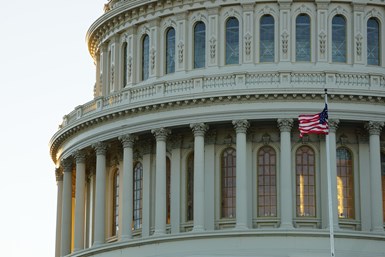House to vote on bipartisan infrastructure bill on Sept. 27
House Majority Leader Steny Hoyer (D-Md.) affirmed the chamber will vote on the Senate-passed bipartisan infrastructure bill on Sept. 27, signaling Democratic leaders are still plowing full speed ahead on their planned timeline even though the larger $3.5 trillion bill to invest in social safety net programs still faces tough hurdles, according to The Hill.
Edited by Margo Ellis

House Majority Leader Steny Hoyer (D-Md.) on Friday affirmed the chamber will vote on the Senate-passed bipartisan infrastructure bill on Sept. 27, signaling Democratic leaders are still plowing full speed ahead on their planned timeline even though the larger $3.5 trillion bill to invest in social safety net programs still faces tough hurdles, according to The Hill.
In a letter to lawmakers previewing this month's legislative session, Hoyer said the House will vote on the bipartisan infrastructure bill the last week of September “pursuant to the rule passed in August.”
Under that agreement between Speaker Nancy Pelosi (D-Calif.) and a small group of moderates, the House is scheduled to vote Sept. 27 on the bipartisan infrastructure bill.
The thirteen House committees tasked with writing the $3.5 trillion package completed their work and advanced their respective portions this week, adhering to a Sept. 15 goal set by Democratic leaders.
Speaker Pelosi this week will be tasked with rounding up the votes for the package with a slim majority that means she can only afford up to three defections.
Aside from Democrats’ two-part infrastructure plan, the House has a packed agenda for the next two weeks it is scheduled to be in session.
Congress has to pass a bill to keep the federal government funded past Sept. 30, when the current fiscal year ends. Lawmakers also need to pass legislation to raise the debt limit, which Republicans have vowed to oppose in protest of Democrats' massive social spending legislation.
Hoyer said the House will vote next week on a stopgap measure to keep the government funded, which is likely to last sometime into early December. He added that it will include supplemental funding for localities fixing damage from recent storms, like Hurricane Ida, which ravaged Louisiana and the East Coast, as well as for resettlement efforts for Afghans who worked with the United States during the war there.
Other items slated for time on the jam-packed House floor schedule include the annual National Defense Authorization Act, which advanced out of the House Armed Services Committee earlier this month.
RELATED CONTENT
-
Recycling Foreign Metals: Buyer Beware
The North American steel-making industry, with its historic record of quality control, is no longer the world’s top producer.
-
Crane ChemPharma and Energy Announces New Saunders Valves Facility
The 100,000-sq-ft facility is planned to open in the fall of 2022.
-
New Technologies Solve Severe Cavitation Problems
An advanced anti-cavitation control valve design enabled by 3D metal printing solved a power plant’s severe cavitation problem and dramatically improved its bottom line.










 Unloading large gate valve.jpg;maxWidth=214)
